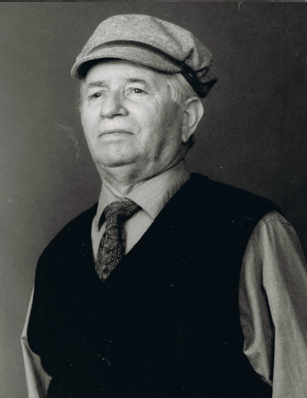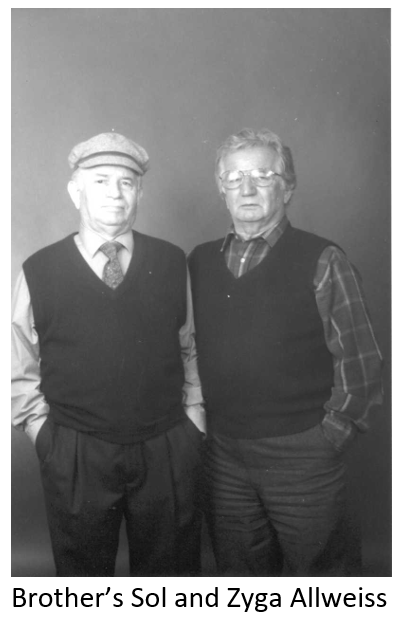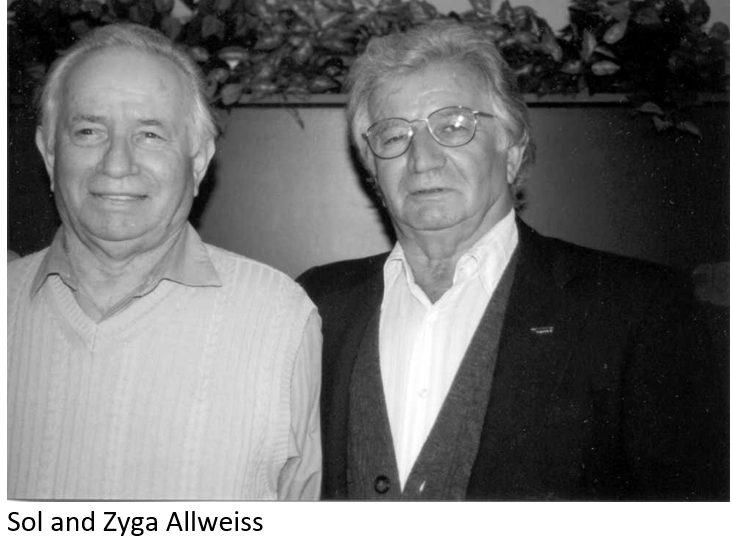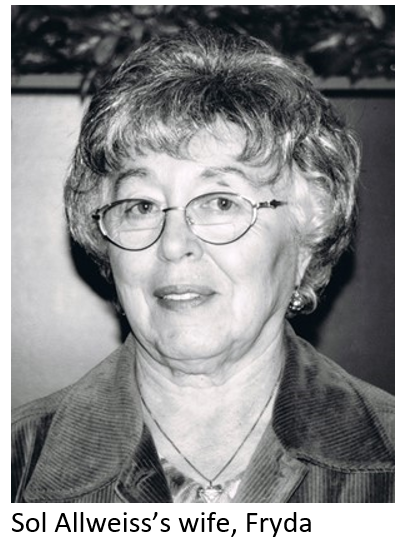Sol Allweiss
"You should treat the people around you like they would be your brothers and sisters."
Name at birth
Salek Allweiss
Date of birth
09/15/1925
Where did you grow up?
Jaslany, Poland
Name of father, occupation
Jacob,
Farmer and horse trader
Maiden name of mother, occupation
Esther,
Homemaker, raised nine children
Immediate family (names, birth order)
My parents, Sara, Luzer, Gitel, Mendel, Fishel, Rachel, Frimcha, Zyga, and me
Who survived the Holocaust?
Me and Zyga
The Germans set up a labor camp called Biesiatka near the town of Mielec in Poland. My brother Zyga and I were able to escape from the camp, but we didn't go together. On March 7, 1943, on a Sunday morning, the Germans came in to Biesiatka with a truck and rounded up the Jews. They shot everybody into a mass grave including three of our four sisters. Our mother died of typhus a couple weeks before the massacre. She is buried at the camp.
Zyga and I were reunited. Our father had returned from Russia. On June 6, 1944, D-Day, we were ambushed in a field. Our father was captured, shot and tortured to death.
My father was good friends with a Polish farmer, Maciej Dudzik. Father told Zyga and me to stay with Mr. Dudzik and his family in Chajkowa, Poland. "He will never double cross you." Mr. Dudzik and his wife, Zofia, agreed to let us stay. They had eight children, including girls, 13 and 14, our age. Sometimes, we were invited to sit inside for breakfast together. It was sometimes a sour potato soup, but we were given our share from the big pot, treated just the same. We stayed in their big fields in the summertime. The fields protected us. The girls would bring us drinks of water.
One day, it was raining so we went into the stable. Mr. Dudzik said we could do this. We saw a truck coming with two German soldiers. They went to the stable and started examining and taking out bales of hay. Zyga and I both had guns. We were hiding behind the last bundle of hay they were about to take. We were ready to shoot them when Mrs. Dudzik ran into the barn just then. She started to scream at the Germans in Polish to leave the wet hay alone. "We’re trying to dry it." If Zyga and I would have killed those two Germans, other Germans would have killed everyone in the village.
Zyga and I took a train to Lvov (Lemberg). We separated there. After the war, I found Zyga in Warsaw. We went to Germany, Czechoslovakia and Austria and wound up in a Displaced Persons (DP) camp called Fohrenwald, which is not far from Munich. We decided we would go to Israel, but that didn't work out. So we decided to go to America instead. We were orphans and got accepted as part of a United States orphans' quota. We sailed on the ship, S.S. Marine Flasher, and arrived in New York with an older cousin and his wife in November 1947. These cousins had a store in New York but we were told about Detroit and decided to come here because we both liked cars. The organization ORT helped us learn welding and car mechanics.
Name of Concentration / Labor Camp(s)
Where were you in hiding?
In forests, fields, and barns near Chajkowa
What DP Camp were you after the war?
Yes, Foehrenwald DP camp, Germany
Where did you go after being liberated?
Lvov, Warsaw, Germany, Czechoslovakia, Austria, and then DP camp at Foehrenwald
When did you come to the United States?
November 1947, with my brother Zyga and our cousin Zygmunt Muhlbauer and his wife, Sallah
Occupation after the war
Auto mechanic and then had a gas station and a garage
When and where were you married?
1951 in the United States
Spouse
Frieda Schiller
Children
Jack, Ben, Tammy, and Phillip (Fishel)
What do you think helped you to survive?
Escaped with brother Zyga to Polish farm, 3 of 4 sisters were shot
What message would you like to leave for future generations?
You should treat the people around you like they would be your brothers and sisters.
Interviewer:
Charles Silow
Interview date:
04/04/2011
To learn more about this survivor, please visit:
The Zekelman Holocaust Center Oral History Collection
https://5152.sydneyplus.com/argus/final/Portal/Default.aspx?component=AAFG&record=df42e928-c75a-4ff4-b4bc-69596463772b
https://5152.sydneyplus.com/argus/final/Portal/Default.aspx?component=AAFG&record=df42e928-c75a-4ff4-b4bc-69596463772b
Experiences
Survivor's map




